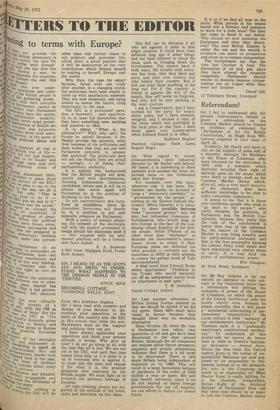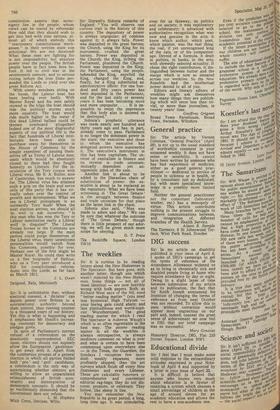Referendum?
Sir: I fail to understand why the present Government's refusal to grant a referendum on the Common Market should be treated as evidence of contempt for " Parliament or for the British Constitution," as Hugh Ross Williamson suggests in your issue of April 22.
Evidently, Mr Heath will have to rely on the support of some sort of a majority, amongst the Members of the House of Commons, who were returned by the electorate in 1970 with a mandate which implicitly included their right of decision upon all the issues which were likely to emerge, such as the Common Market (about which, after all, only a very small minority of the electorate does have sufficient knowledge to be able to make competent judgement).
It seems to me that it is those over-vociferous people who wish to " go back to the people," who really threaten the authority of Parliament and the British Constitution, because they imply that the rule of the uninformed is better than that of the informed. So, the matter of the Common Market is now being steadily used for party-political purposes; and that is the less acceptable because the Labour Party itself might well have negotiated very similar terms of entry, if it had held the prizes of parliamentary power.
Eric Glasgow, 45 York Road, Southport Sir: Mr Roy Jenkins is far too smooth an operator to state outright in his resignation letter that a referendum will infringe the monopoly of power of the House of Commons, on which the power of the Liberal intellectual over the people wholly rests. Instead he pleads smoothly that it will cause a " substantial undermining of par liamentary responsibility." Mr Lever colours it with "mockery of our parliamentary institutions." Mr Thomson calls it a "profoundly reactionary constitutional mechanism." To understand all this double-talk we cannot do better than to refer to Orwell's fascinating dictionary — Animal Farm. Notice the nice twist this Oxford sophist gives to the notion of responsibility! Ministers are now supposed to be responsible to Parliament instead of to the monarch. But who is the Commons supposed to be responsible to? What Master Royal is really fighting for is the absolute, irresponsible, Divine Right of the Anointed Member of Parliament! How odd that these men should be so eager to join the Common Market whose constitution asserts that sovereignty lies in the people, whose views can be tested by referenda! How odd that they should wish to get into bed with nine nations, almost all of which embody this "reactionary constitutional mechanism " in their written state con stitutions! We are not deceived! What these men are fighting for is not responsibility but absolute power over the people. The British people have in fact been here before. It led to civil war in the seventeenth century, and to serious rioting before the Iron Duke persuaded the Lords to yield over the great Reform Act. With ninety wreckers sitting on the boom, the Labour boat has been heeling over badly. With Master Royal and his men safely stowed in the bilge the boat should ride the political storms much more squarely. The boat would ride much higher in the water if this dead Liberal ballast could be thrown overboard altogether! Indeed one of the most disgraceful aspects of our political life is the fact that hundreds of Liberal intellectuals have been able to purchase seats for themselves in the House of Commons by the simple expedient of passing themselves off as Tories or Labour men; seats which would be absolutely closed to them had they fought honestly as Liberals. For the inoculation of the Tory corpus with Liberal virus, Mr R. A. Butler, now of Cambridge, has much to answer for. The Liberal virus has attained such a grip on the brain and nerve cells of this party that it has virtually taken over the control of growth and development. What we see is Liberal protoplasm in an outwardly Tory husk! When the next election arrives, we should all do well to ask ourselves; " Is this man who has won the Tory or Labour nomination really a Liberal wolf in disguise?" The Liberal Trojan horses in the Commons are already too large. If the main parties could purge themselves of the Liberal virus, many unwelcome personalities would vanish from the Commons, possibly for ever, Perhaps one of the first might be Master Royal. He could then write us a fine biography of Balfour, who as a Tory peer introduced a Bill for constitutional referendums into the Lords, as far back as March 1911.
J. L. Owen Dolgoed, Bala, Merioneth Sir: It is unthinkable that, without electoral consent, a ' dictator ' can depute power over Britons to a supranational authority beyond their control, thus running counter to a thousand years of our history. Yet this is what is happening and it emphasises Mr Heath's increasing contempt for democracy and pledges given.
In spite of Parliament's current refusal of a referendum on the absolutely unprecedented EEC issue, electors should not supinely allow the Europeanist ' gauleiters ' to get away with it. Apart from the cumberous process of a general election in which all parties fielded both ' pro ' and anti' candidates. a referendum is the only way of ascertaining whether electors are willing to allow an unparalleled relinquishment of British sovereignty and disintegration of democratic concepts. It should be so vociferously demanded that the Government dare not refuse.
L. M. Hopkins Wick Crest, Devizes. Wilts. Sir: Disraeli's Sidonia remarks of England: "You will observe one curious trait in the history of this country. The depository of power is always unpopular; all combine against it; it always falls. Power was deposited in the great barons; the Church, using the King for its instrument, crushed the great barons. Power was deposited in the Church; the King, bribing the Parliament, plundered the Church. Power was deposited in the King; the Parliament, using the people, beheaded the King, expelled the King, changed the King, and, finally, for a King substituted an administrative officer. For one hundred and fifty years power has been deposited in the Parliament, and for the last sixty or seventy years it has been becoming more and more unpopular. . . . It is impossible to resist the impression that this body also is doomed to be destroyed."
Sidonia's prophetic utterance was made nearly one hundred and thirty years ago and has, in part, already come to pass. Parliament is no longer the dominant power in the state; the executive and those to whom the executive has delegated powers have superseded it. The executive's instrument in this has been capitalism. The obverse of capitalism is finance and its reverse is trade unionism: mutually dependent yet antagonistic sides of the coin.
Another link is about to be added to the Disraelian chain of substitution of power: the executive is about to be replaced as the repository. What we have been witnessing in 'The Great Debate is the struggle between finance and trade unionism for that place as the latest link in the chain.
Sidonia also said, "Man was made to adore and obey." We can be sure that whatever the outcome of "Fhe Great Debate,' though there is little prospect of our adoring, we will be given much more scope for obeying.
D. T. Price 72a Redcliffe Square, London SW10











































 Previous page
Previous page